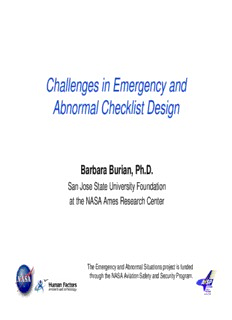
Challenges in Emergency and Abnormal Checklist Design PDF
Preview Challenges in Emergency and Abnormal Checklist Design
Challenges in Emergency and Abnormal Checklist Design Barbara Burian, Ph.D. San Jose State University Foundation at the NASA Ames Research Center The Emergency and Abnormal Situations project is funded through the NASA Aviation Safety and Security Program. Emergency and Abnormal Situations Project Industry Contacts and Consultants Manufacturers: Boeing, Bombardier, Airbus Industries, BAe Systems, Regulatory and FAA, CAA (UK), JAA, ICAO, Governmental Agencies: Eurocontrol, NavCanada Unions and ALPA, APA, SWAPA, ATA, IATA, AFA, Trade Groups: ADF Accident Investigation NTSB, TSB of Canada, ISASI Bodies: Airlines: Airborne Express, Air Canada, Alaska, Aloha, American, Atlantic Southeast, Cathay Pacific, Continental, Delta, Fed Ex, Frontier, Hawaiian, Horizon, JetBlue, Southwest, United, UPS, US Airways, TWA (prior to merger) Emergency and Abnormal Situations Project 15 Different Categories of Issues – some are related to: Training Human Performance under Stress Automation and Automated Aircraft Systems Emergency Equipment and Evacuation Issues Checklists and Procedures Challenges in Emergency and Abnormal Checklist Design Smoke, Fire, and Fumes Checklists and Procedures Smoke, Fire, and Fumes Checklists and Procedures What Drives (or Should Drive*) the Design and Content? • Differences in aircraft and equipment design • Understanding of how different types of fires are ignited, fed, and spread • Type of operations – extended range, passenger vs. cargo • Assumptions about efficacy of crew response and expectations about amount of time available • Human factors considerations, Understanding of human performance while under stress * • History of the air carrier, History within the industry • Philosophies, company policies, and economic considerations • Regulations, Advisory Circulars, etc. Smoke, Fire, and Fumes Checklists and Procedures A Few of the Many Issues Ambiguity of cues / level of certainty Timing of source identification vs. about situation smoke removal vs. descent initiation vs. fighting fire Conflicting warnings / cues High false smoke alarm rate Smoke / Fumes of an unknown origin EROPS – nearest airport is far away Determining / Accessing the proper checklist Ditching while on fire Length of time to complete procedures How much troubleshooting Initiate descent / diversion and when Fire in inaccessible places What type of descent profile Powering down electrical buses Checklist wording – how compulsory Circuit breaker resetting Reduced visibility – font size, layout If / when to declare an emergency with ATC What memory items Communicating / coordinating with Cabin crew Smoke, Fire, and Fumes Checklists and Procedures A Few of the Many Issues Ambiguity of cues / level of certainty Timing of source identification vs. about situation smoke removal vs. descent initiation vs. fighting fire Conflicting warnings / cues High false smoke alarm rate Smoke / Fumes of an unknown origin EROPS – nearest airport is far away Determining / Accessing the proper checklist Ditching while on fire Length of time to complete procedures How much troubleshooting Initiate descent / diversion and when Fire in inaccessible places What type of descent profile Powering down electrical buses Checklist wording – how compulsory Circuit breaker resetting Reduced visibility – font size, layout If / when to declare an emergency with ATC What memory items Communicating / coordinating with Cabin crew Smoke, Fire, and Fumes Checklists and Procedures Methods for Accessing the Correct Checklist: • Gateway Checklist • Several Separate Checklists • One Integrated Checklist Accessing the Correct Checklist: Gateway Checklist Accessing the Correct Checklist: Several Separate Checklists
Description: